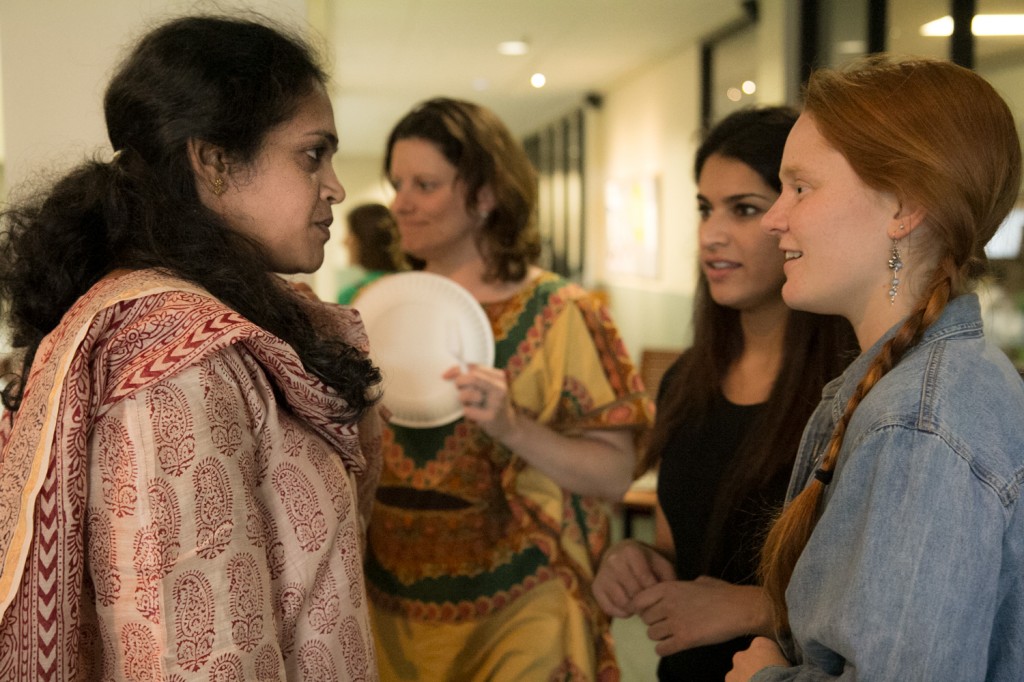What started in the mid-1990s as a series of lunches where those working in the peacebuilding field could exchange ideas on theories and practice has grown into a world-renowned institute for peacebuilding and development professionals, without losing its emphasis on relationship building.
The annual Summer Peacebuilding Institute (SPI) now consists of four seven-day sessions at Eastern Mennonite University that bring together people as diverse as the Syriac Orthodox (Catholic) archbishop of Homs, Syria, Native American peacemakers, and Muslim women from Kenya.
“We try to create a safe space where people from various sides of a conflict can sit together and talk outside of the conflict zone,” said SPI director Bill Goldberg, who has worked at SPI since 1999. “Over the years we have had Israelis and Palestinians sit and talk about ways to resolve social issues in their countries. We had Hutus and Tutsis work together just years after the genocide in Rwanda and Burundi.
“Bringing people together outside of class is just as important to SPI’s mission as the classes that are offered,” said Goldberg. “Having all these people living in Hillside [dormitory] and eating lunch together creates interesting bonds,” he added, recalling how touched he felt when a Palestinian Muslim woman and her Christian Eastern European roommate prayed together in their room for the end of a terrible crisis in Palestine.
This year, SPI is hosting 200 people from more than 40 countries in four sessions from May 5 to June 13, 2014. In each session, participants must choose one course to take from an array of possibilities, including courses that focus on restorative justice, building peace through the arts, and addressing psychosocial trauma. Participants in the first two SPI sessions included a cohort of Kenyan women enrolled in EMU’s two-year-old Women’s Peacebuilding Leadership Program and another women’s cohort consisting of Iranian-Islamic scholars.
SPI faculty offer grounding in both the theory and practice of peacebuilding. Of the 20 faculty members, almost all are practitioners as well as academics. Almost half hold a master’s degree from EMU’s Center for Justice and Peacebuilding, under which SPI operates. One of the many notable faculty members teaching this year is international mediator Hizkias Assefa, who has taught at every session of SPI since its founding and has spent much of 2013-14 guiding talks among warring factions in South Sudan.
During the first session of SPI, ending May 13, two classes caught the artistic imagination of participants. A new class, “Media for Societal Transformation,” yielded four mini-documentaries on trauma, using art to foster peace, and respect diversity. On the last night of the first session, these documentaries were screened before an enthusiastic audience of more than 50 SPI participants, staff, and faculty.
The buzz created by the documentaries inspired another class – “Understanding Psychosocial Trauma” – to invite others at SPI to experience their healing journey by viewing the many drawings and writings posted on their classroom walls, floors and tables.
This healing gallery explored trauma on a personal level, explained Richard “Richy” Bikko, a 2011 EMU graduate who now works for DiPaD, the Daima Initiatives for Peace and Development in Kenya. Bikko, who has been working with refugees and internally displaced persons, saw the classes’ approach to dealing with trauma as a way to connect with people who have lost everything.
Both Bikko and Goldberg emphasized the importance of the warm, collegial relationships between faculty and students in making SPI a special experience. “There is an understanding that the faculty teach the students, but at the same time, the students, through their stories and wisdom, also teach each other and the faculty,” said Goldberg.
A team of five undergraduate and graduate students, called “community assistants,” smooth the way for SPI participants, especially those from foreign countries, by living in the dorms with the participants and organizing grocery store trips, extra-curricular activities, sporting events, and fun outings. They also guide participants to health care if needed, and otherwise do their best to to make them feel welcome, secure, and at home.
Aaron Erb, a graduate student in peacebuilding who is one of the community assistants, described the 24-hour-a-day experience as being both overwhelming and compelling. The best part of the job? The transformative social interactions taking place on a daily basis, he said.
A number of former SPI participants and colleagues from around the world will be returning to Harrisonburg May 19–23 for a special consultation related to the Strategies in Trauma Awareness and Resilience (STAR) program. Goldberg described this as an attempt to enhance and increase the types of programs offered by STAR, through an analysis of what has worked in the field.
